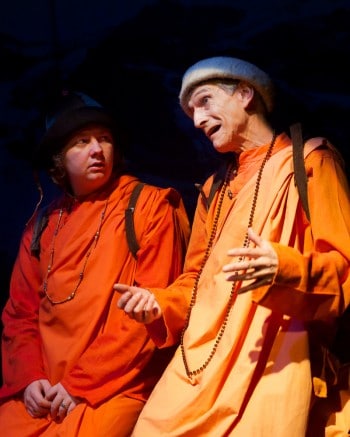Thief of Time at The Bakehouse Theatre

It is a considerable challenge to adapt any novel by Comedy/Fantasy/sci-fi writer Sir Terry Pratchett to the stage, and perhaps even moreso to direct and produce it. Pamela Munt and The Unseen Theatre Company are to be commended on even attempting to bring this world premiere to the stage. It is not their first either, but this 26th novel in the Discworld series is a particularly difficult one, perhaps especially if you have not read several of its predecessors.
Pratchett’s writing, though very popular, is not necessarily everybody’s cup of what-you-will. But there is always genuine humour, serious inquiry, and crazy fantasy, and these elements are well portrayed in this adaptation.
Lobsang/Jeremy (two people who are actually one, is played with a pleasant naiveté by Leighton James) is detailed by the Auditors to steal Time and stop it. But Time is anthropomorphised also as his Mother. He is helped by Susan (Amelia Lorien), the niece of Death, personified in stolid and gentlemanly style by Hugh O’Connor. Amongst all the other strangenesses, Death tries to round up the other Horsemen of the Apocalypse, including Ronnie Soak (Kaos backwards) the fifth one, amusingly portrayed by Tony Cockington, who had left the other four to become a milkman. In the Oi Dong Monastery, Lobsang is apprenticed to Lu-Tze (the agile and humorous Philip Lineton), who knows something of the “tick of the Universe” and whose job as an old History Monk is to make sure tomorrow happens . . . are you with me? There is actually quite a bit more confusion as well.
Naturally, this play is surreal, disjointed, quirky and full of non–sequiturs, which must have made learning the lines a bigger challenge, which this cast has mastered well. The lighting (Stephen Dean) is essential to the production. He also managed the sound, and the nice device of projecting both scenic backgrounds and the narration/ comments by “Footnote” (Melanie Lyons) onto a black curtain. However the recording of the footnotes was not as clear as it might have been, and was sometimes overshadowed by the somewhat clunky scene changes, of which there are many.
Nevertheless, altogether this is a creditable attempt at a challenging piece of theatre.


